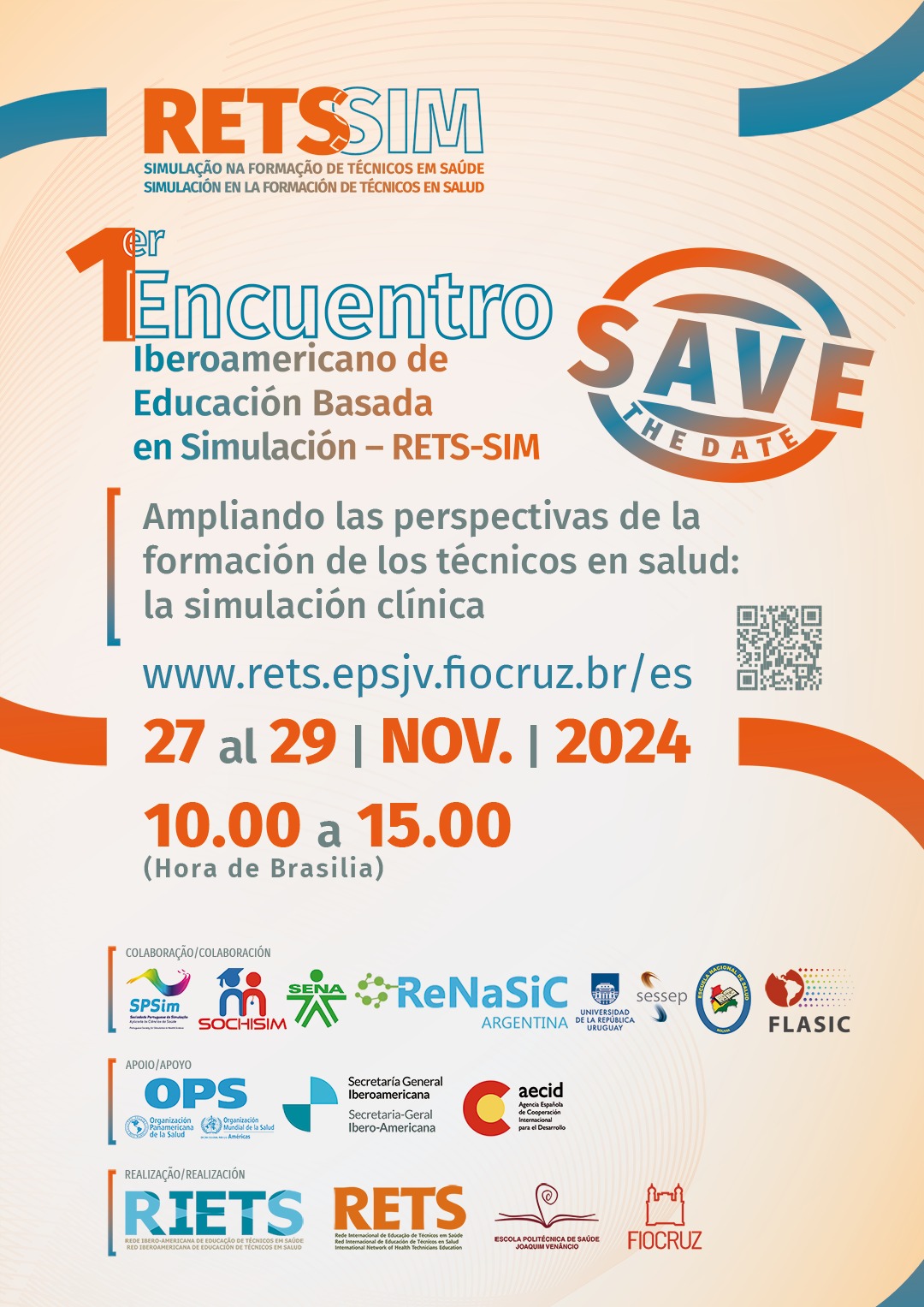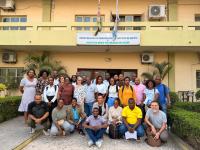Ibero-American meeting on simulation in healthcare training aims to gather over 2,500 participants.

Get ready! On November 27, 28, and 29, the 1st Ibero-American Meeting on Simulation-Based Education will be held, specifically aimed at training health technicians.
The event aims to bring together around 2,500 people in an immersive virtual metaverse format, including experts in the field; students, teachers, and managers of training institutions; health technicians from different areas and levels of training; and health cooperation and regional integration organizations to exchange experiences with each other and with their peers in more than ten countries. Participation in the event is free. Pre-registration information will be released shortly.
The meeting is organized by the Joaquim Venâncio Polytechnic School of Health (EPSJV/Fiocruz), the Ibero-American Network of Education of Health Technicians (RIETS) and the International Network of Education of Health Technicians (RETS), with the support of the Spanish Agency of International Cooperation for Development (Aecid), through the Ibero-American General Secretariat (Segib), and the Pan American Health Organization (PAHO/WHO).
The meeting is organized by the Joaquim Venâncio Polytechnic School of Health (EPSJV/Fiocruz), the Ibero-American Network of Health Technicians Education (RIETS) and the and the International Network of Education of Health Technicians (RETS), with the support of the Spanish Agency of International Cooperation for Development (Aecid), through the Ibero-American General Secretariat (Segib), and the Pan American Health Organization (PAHO/WHO).
The event is organized in collaboration with the National Clinical Simulation Network of Argentina (ReNaSic), the Latin American Federation of Clinical Simulation and Patient Safety (Flasic), the Chilean Society of Clinical Simulation and Patient Safety (Sochisim), the Spanish Society of Simulation and Patient Safety (Sessep), the Portuguese Society of Simulation Applied to Health Sciences (SPSim), the National Learning Service of Colombia (Sena), the National School of Health of Bolivia (ENS) and the University of the Republic of Uruguay (Udelar).
According to Gabriel Muntaabski (ReNaSic), one of the coordinators of the meeting, this will be the first major event on the subject of simulation, especially aimed at the training of healthcare technicians, to be held in the metaverse. “This meeting is a milestone, both in terms of its grandeur and innovative format,” he underlines. “It will mark the beginning of a new way of organizing virtual events from now on,” he adds.
Stay tuned for more information. Subscribe to the RETS Newsletter to keep up to date with everything we have planned for the meeting.
 What will you find at the event?
What will you find at the event?
The First Iberoamerican Simulation Meeting - RETS SIM is based on the Rio de Janeiro Declaration and follows the objectives and actions proposed in the document. It should be noted that, in a global world in which technology, new healthcare proposals, and personnel training for the sector, as well as inequalities in access to them, are advancing rapidly, this meeting emerges as a crucial initiative to bring together simulation experts and health technicians from all over Ibero-America.
The virtual immersion and free nature of the event will facilitate broad participation, eliminating geographical and social barriers. This meeting is not only timely but essential, as it provides a space to generate innovative ideas that will transform the training of healthcare technicians in Ibero-America and other countries.
“Our objective is to generate a space for the exchange of knowledge and experiences, teaching and learning, and cooperation between states, organizations, and individuals related to the use of simulation strategies in the training of healthcare technicians in the Ibero-American region,” explains Gabriel.
The meeting will be held entirely on an immersive metaverse virtual platform that allows participants to move freely through the different spaces and attend synchronous and asynchronous presentations, participate in forums by technical specialty, take part in simulation forums, access videos, documents, and photos, and interact in real time with each other in different ways (chat, videoconferencing, exchange of contact information).
The platform has a capacity for 2,500 simultaneous users represented by avatars, with real-time interaction, global accessibility, and comprehensive technical support.
In this sense, during the five hours of the event, participants will be able to move, through their avatars, between the different activities that make up the event's program.
In the central auditorium, with a capacity of 2,500 people, there will be four daily lectures, with the possibility of interaction between speakers and participants. In the Thematic Simulation Rooms (SIM), with a capacity for 200 people, there will be six daily meetings to discuss essential simulation concepts and practices (SimZones, Prebriefing, Debriefing, etc.).
It will also be possible to visit stands on technical specialties, where it will be possible to download files, watch videos, insert links (forms, web, networks, etc.), and participate in meetings with technicians of these specialties from all countries. There will also be stands from the participating countries, where everyone will be able to learn a little about the world of health technicians in each of them.
The Rio de Janeiro Declaration on simulation in the training of health technicians: a commitment of the networks
The November event will give continuity to the construction of knowledge on the subject, starting in 2023, when the RIETS events were held. An international seminar that brought together experts from six countries was held at EPSJV/Fiocruz on December 4 (morning and afternoon), broadcast in Portuguese and Spanish on YouTube. The seminar aimed to deepen the knowledge of clinical simulation as a teaching-learning strategy and to discuss the processes of incorporating simulation in the training of healthcare technicians.
The second event, held the following day, was a Workshop for invited guests, in which the main strategies -teaching, research, institutional articulation, and cooperation- to advance the implementation of clinical simulation programs in health technician training institutions in the Ibero-American context were discussed.
At the end of the workshop, the Rio de Janeiro Declaration on simulation-based education in the training of health technicians was drawn up, which addresses the need to promote the inclusion of clinical simulation-based education in the training of health technicians and proposes an agenda of initiatives up to November 2024 for the RIETS. The document points to a future in which all health technician training institutions can incorporate simulation-based education into their courses.



